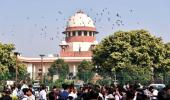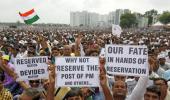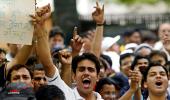The Supreme Court Monday took serious note of the election process reserving the post of president of a panchayat samiti in Maharashtra for the Other Backward Class category, saying it is 'clearly in the teeth' of the judgment delivered by the apex court earlier this year.

“We will have to intervene now. This is trying to overreach the Supreme Court decision,” a bench of Justices AM Khanwilkar and CT Ravikumar said.
The bench issued notice to the collector concerned asking why appropriate action should not be taken against him for initiating the election process reserving it for the OBC category to fill the vacancy in the panchayat samiti despite an 'unambiguous decision' of a three-judge bench of the top court.
The apex court was hearing a petition against the Bombay high court order which was passed on a plea assailing the decision of concerned authority reserving the post of president of the panchayat samiti for the OBC category.
During the hearing, the top court observed that in a separate matter which had come up earlier before it, a three-judge bench had delivered a judgment in March this year in which the court had noted the triple test to be followed before provisioning such reservation for the OBC category.
The bench also issued notice to the respondents, including the state of Maharashtra, on the plea and posted it for hearing on January 5.
It said the incumbent president of the panchayat samiti would not get involved in taking policy decision in connection with the gram panchayat.
The counsel appearing for the petitioner referred to the earlier judgment of the apex court and said the post of president cannot be reserved for the OBC category.
The bench observed that after the verdict delivered by the apex court, if such thing is happening then it would have to issue contempt notice.
While hearing two separate petitions, the apex court had on December 6 stayed till further orders the local body election in Maharashtra on 27 per cent seats reserved for the OBC.
The top court had made clear that the election process for the other seats would continue.
It had passed the order last week while hearing two pleas, including the one assailing the provisions inserted/amended through an ordinance permitting reservation for the category of backward class of citizens up to 27 per cent uniformly throughout Maharashtra in the concerned local bodies.
It had then observed that a similar issue had come up earlier before it and a judgement was delivered in which the court had noted about the triple test to be followed before provisioning such reservation for the OBC category.
It had also noted that this was a reiteration of the exposition of the Constitution bench on the issue of quantum of the reservation to be provided for OBCs.
The counsel appearing for Maharashtra had told the court that the provision in the ordinance is in conformity with the decision of the apex court and it is only providing for reservation to the category of backward class citizen up to 27 per cent.
In March this year, the apex court had said that reservation in favour of OBCs in concerned local bodies in Maharashtra cannot exceed aggregate 50 per cent of the total seats reserved for Scheduled Castes, the Scheduled Tribes and OBCs taken together.
The apex court, while reading down Section 12(2)(c) of the Maharashtra Zilla Parishads and Panchayat Samitis Act 1961 which provided 27 per cent reservation for persons belonging to the backward class, had also quashed the notifications issued by the state election commission in 2018 and 2020 to the extent of providing reservation of seats in concerned local bodies for OBCs.
It had referred to the triple condition noted in the Constitution bench verdict of 2010, including setting up a dedicated commission to conduct a contemporaneous rigorous empirical inquiry into the nature and implications of the backwardness qua local bodies within the state.











 © 2025
© 2025